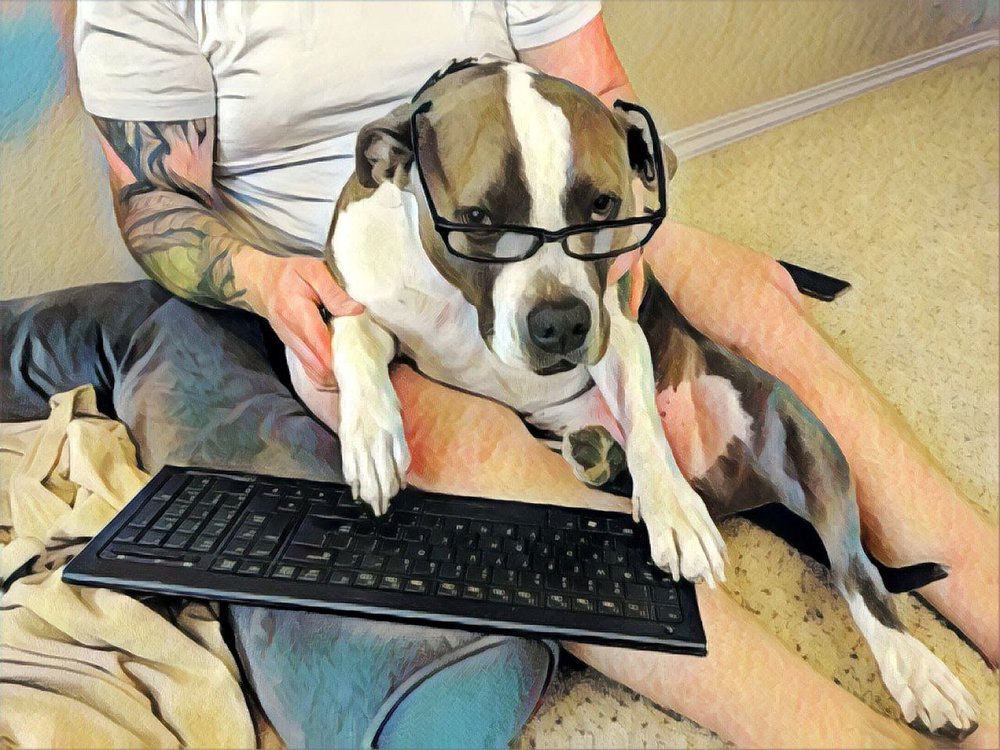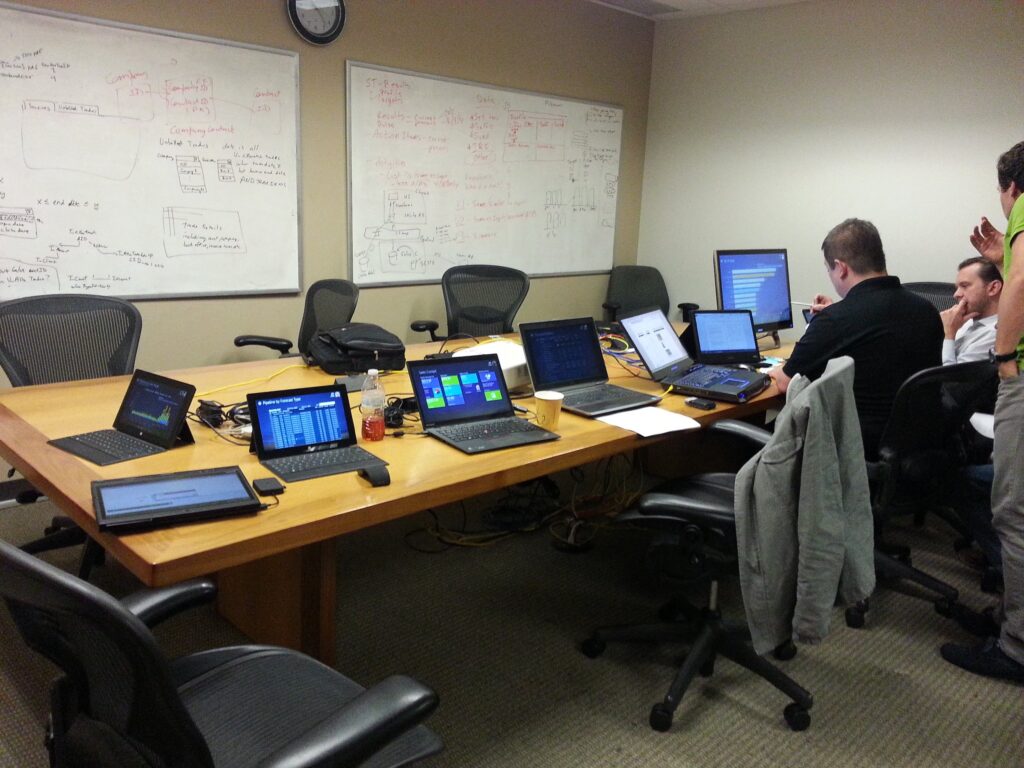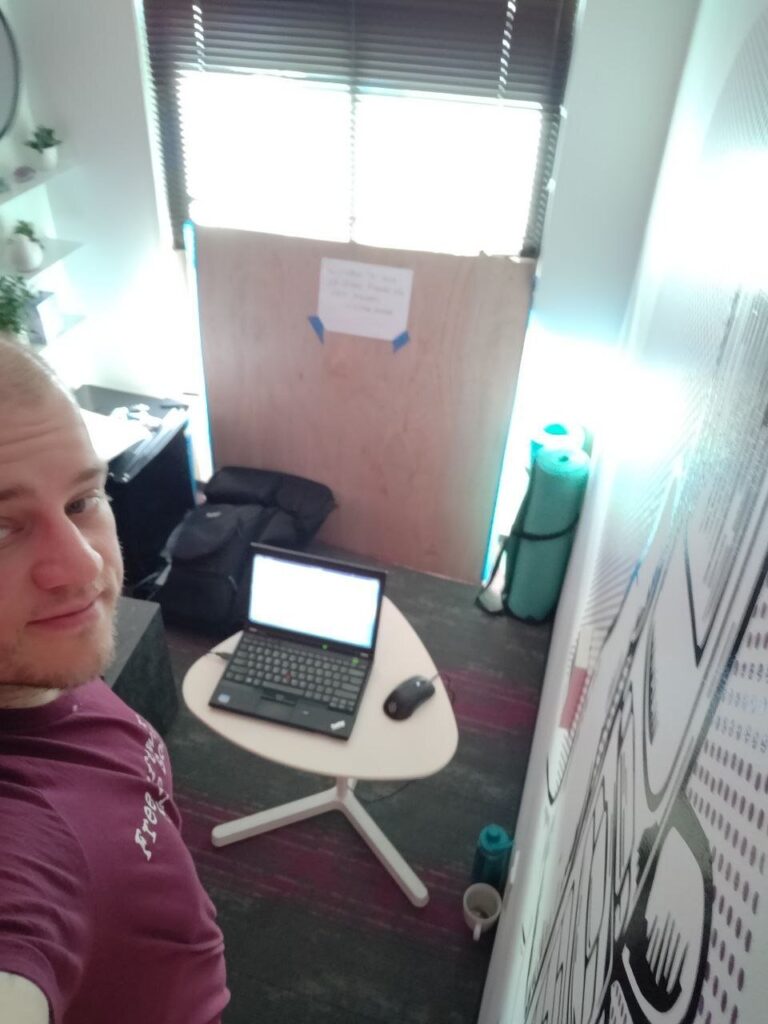What does personal cybersecurity mean to you? Do you know about the latest innovations? Are your smartphone and online security needs being met? Do you need help crafting a super-safe password? How would it feel to be free of data breaches, ransomware, and phishing scams?
Look no further than Cyber Safe’s Josh Wilcox, your online personal security expert, and fellow Vibe member.

Through their company, Cyber Safe, Vibist Josh Wilcox provides guided installation support for password management apps like 1Password, LastPass, and more. They also consult on crypto-related projects like NFTs and cold storage wallets.
First and foremost, Josh believes that work is no fun without play. “I’ve been exposed to a lot of people who do work they don’t love, just to make enough money to do what they do like. That’s kind of an accepted notion in our society. But I’ve always questioned that. I want to really figure that out for myself, how I can be productive in society while playing. Because that’s where innovation comes from, those happy accidents that occur to you when you just play!”
Josh, who goes by the pronouns they/them, is so disarming that you can’t wait to sit down and talk to them. They demonstrate an incisively creative mindset, incorporating in a rush of fresh air all that they think and feel—and in the way they move from the table to the whiteboard and back again. Drawing, speaking, asking, musing. The world Josh inhabits is populated with purely original ideas. Unleashing them, this entrepreneur enthuses and amuses, smiling all the while.
Having met their now-wife Julia in Seattle’s Queen Anne district, Josh describes themself as a modern-day explorer of the planet and the wireless world, akin to Ernest Shackelton but in the 21st century. They capture the details and the big picture of the project at hand.
“I’m interested in just how we can adventure into different parts of the Internet, thereby creating a new kind of adventurer,” Josh philosophizes. “I’ve taken exploring to heart, traveling all over the Pacific Northwest and in California from 2016 to 2018.”
How would you describe yourself in three sentences?
Josh: I‘m not sure, actually. Very philosophical. I don’t really own my own identity, always questioning who I am and questioning other things as well.
Curious. An unidentifiable object, maybe? I don’t feel quite human, like I’m living in a simulation or a virtual world. I’m pretty abstract, and it’s hard to get me into concrete things. Hey, this process [Vibe interview] is much cheaper than therapy!
What has contributed the most to the expansion of your skillset over time?
Josh: Two things. Curiosity and money. The things that I’m curious about and drive myself towards. That’s been about half my career.
How do you define success?
Josh: I think success is adventuring. I think if you’re on an adventure and you’re straddling the line between order and chaos, that’s success.

Josh and their dog working together on important cyber security matters.
Tell us a bit about that amazing tattoo on your right arm.
Josh: It’s another abstract, called the alien biomechanical piece. Not a specific character or anything, and not the biomechanics of a human being where you have muscle, bone, and nerves. It represents kind of how it might feel to be an alien. Not technically, but theoretically.
The artist lives in Oregon, where I used to be. I initially had this idea of two matching tattoos on the inside of my calves, one black and one white with an outer space theme. An astronaut on one side, and the reflection of him in his helmet on the other.
While I’m waiting, the guy says, “Here. Take a look at my artbook.” I start flipping through his portfolio, and there’s this digital 3-D rendering of a full sleeve with a deep black background and deep greens. “Oh, do you like that?” he queries. “Nobody notices it usually. I designed it on the computer about five years ago. I really want to see it on somebody. So much so, I’ll give you a huge discount.”
I think about it. I think just for a moment because it looks like something I would have come up with. It’s rad. “Let’s do it!” I confirmed. We sealed the deal right then and there.
The experience became a huge life lesson for me. Sitting in that uncomfortable chair for hours upon hours, I learned about the commitment of sticking to something, even though it’s painful. Kind of addictive, the whole thing. He must have worked on it for 10 sessions or more, but we never finished it.
What do you bring most to the Vibe table (lunch and otherwise)?
Josh: Well, I think it’s actually kind of hard for me. I feel kind of like I’m in an identity crisis, or like I’m in some kind of unknown identity state.
How am I going to part of community when I’m not sure of who I am? It’s an experiment, and I am an experimenter at heart. My wife refers to me a serious tester all the time. I run around testing processes, changing things around the house. Then when she goes looking for things, it’s “Where’s my old damn spatula? My Grandma had that for 25 years! Did you throw it away?” Of course, I did!
I bring that experimental spirit to the Vibe community, not knowing quite who I am simultaneously. I think it helps other people too if they’re part of all my instincts for experimenting. I’m not rigid. More fluid.
Tell us a bit about your passion for cyber security.
Josh: So, I guess I’m a version of the word hacker that is not a pejorative, not a negative term necessarily in my book. Instead, it comes from older times of computers, before I was born even, at MIT and elsewhere. Between that and sci-fi novels, I knew that there’s this person that goes in and understands systems so thoroughly that they can basically fix it, maintain, it, upgrade it, or manipulate it.
I’ve always been one of those people ever since I was little. Taking apart cars, TVs, remotes, and the like were a hobby for me. Learning to pick locks and keying into little coding systems. It wasn’t until my tech career that people were actually doing jobs like that. I didn’t think, at the time, that I had enough experience on my resume that was security specific. That got me thinking: How can I contribute my passion and curiosity to something that is an actual business, that can actually change how people understand their lives?
I decided that the missing piece in cyber security was the human talent targeted towards ordinary people. Right now, the industry treats ordinary people with ordinary tools. Say, an app. But you don’t have a person that is a trusted institution as a standard in society. You keep it to yourself, you can’t trust anyone, you have to do it yourself. There’s a gap in the apps. In the past 15 years, you’re asking, “Where’s my source code?”
That’s what got me rolling, creating a new institution in society that is a password person for ordinary people. A PPOP, if you will.

How did you “meet” Vibe?
Josh: Well, through food, I guess. We had already been here for six or eight months, before my wife and I realized there was a nearby restaurant called Crabtree Kitchen + Bar. I say to Julia, “Look, there’s a coworking place over there. Vibe. And every first Friday is free.”
I only knew what it looked like on the outside…So, off I go to Vibe. Brittany [Corona] was staffing the desk and asked if I’d like to have a tour. I was pretty sure I couldn’t afford this place, but let’s just see. The thing that really hooked me in was the whiteboard walls. Whiteboard. That’s my jam.
And then there are all the community events and Slack and everything’s so organized. I knew being a member here would help me a lot, enough to pay for itself. It’s going to be better for me than the other coworking spaces in the area, I realized. And it is!
What’s most welcoming to you here at Vibe?
Josh: Specifically, it’s been the Nest Wellness Room because, as someone who’s neurodivergent, I have specific needs. I have to maintain a perfect balance of not so stimulated that my brain bounces around too much and not so understimulated so that I’m bored. The Nest has control features for the lights and sounds, available with consideration for my neurodivergent self.
I could be myself here [at Vibe]. I could start any channel I want in the Vibe Slack workspace. There’s a sense of ownership. It’s a place that’s perfect for my headspace, and a space to reinvent myself virtually.

How can communities and workplaces be more inclusive when it comes to neurodiversity?
Josh: There’s a very thin line for people like me. Being neurodivergent means that you often don’t know whether or not you should act “normal” for the benefit of others to maybe make them feel less awkward. Especially when it comes to a work environment. Or, should I act like myself for the benefit of making me less awkward.
Say I come into the office at 7:00 a.m. and turn off the lights. But the Host or Space Captain comes in and turns them on. Do I ask, “Do you mind if I turn the lights back off?” Can I trust this person and myself that I feel safe enough to ask for what I need?
It’s about knowing that it’s appropriate for me to ask for that. I don’t necessarily know how to solve that problem though at times. If a neurodivergent doesn’t feel comfortable, others may not get their whole personality, and then they’re missing out. It’s not good for anybody.
Who’s your absolute hero?
Josh: Nicola Tesla. The Serbian inventor of pretty much everything that’s “modern electrical.” I think that sums him up. I have huge respect for Nicola. He was a very abstract thinker, like myself. Before drafting anything, he would fully imagine what he wanted to execute. Then, he would go to build it and it would work, just from his mind’s blueprint to a working prototype. That’s so impressive to me.
